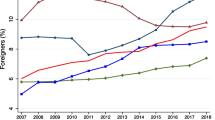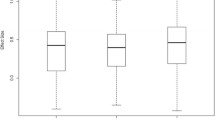Abstract
Using the Canadian sample from the Programme for International Student Assessment, this study examined the effects of student and school characteristics on academic achievement of immigrant and non-immigrant students. No differences were found in mathematics achievement, but non-immigrant students outperformed immigrant students in both reading and science achievement. At the student level, there was more gender equity in academic achievement among immigrant than non-immigrant students. Socioeconomic inequity was related to fathers among immigrant students but to both mothers and fathers among non-immigrant students. Home language had weaker effects among immigrant than non-immigrant students. At the school level, teacher-student ratio, teacher morale, and academic pressure were predictors for immigrant students, whereas disciplinary climate for non-immigrant students. Non-immigrant students demonstrated tremendous regional differences that were absent among immigrant students.
Résumé
S'appuyant sur l'échantillon canadien tiré du Programme international pour le suivi des acquis des élèves, cette étude s'est penchée sur les effets qu'ont les caractéristiques de l'élève et de l'école sur les réalisations académiques des élèves immigrants et non immigrants. Aucune différence n'a été notée quant aux réalisations en mathématiques, mais en ce qui concerne les réalisation en lecture et en sciences, les élèves non immigrants ont affiché un rendement supérieur à celui des élèves immigrants. Chez les élèves immigrants, l'équité entre les sexes telle que reflétée par les réalisations académiques était plus marquée que chez les élèves non immigrants. Alors que l'inéquité socioéconomique relevait du père chez les élèves immigrants, chez les élèves non immigrants, elle relevait de la mère et du père. L'influence de la langue parlée à la maison était plus faible chez les élèves immigrants que chez les élèves non immigrants. Au niveau de l'école, le rapport d'ensaignant à élève, le moral de l'enseignant et les exigences académiques constituaient des variables explicatives pour les élèves immigrants, alors que pour les élèves non immigrants, c'était le climat disciplinaire qui jouait ce rôle. Les élèves non immigrants manifestaient de très grandes différences régionales, écarts qui étaient absents chez les élèves immigrants.
Similar content being viewed by others
References
Adams, D., Astone, B., Nuñes-Wormack, E., & Smodlaka, I. (1994). Predicting the academic achievement of Puerto Rican and Mexican-American ninth-grade students. Urban Review, 26, 1–14.
Bhattacharya, G. (2000). The school adjustment of South Asian immigrant children in the United States. Adolescence, 35, 77–85.
Biles, J., & Burstein, M. (2003, April). Immigration: Economics and more. Canadian Issues, 13–15.
Commins, N.L. (1992). Parents and public schools: The experiences of four Mexican immigrant families. Equity and Choice, 8(2), 40–45.
Duran, B.J., & Weffer, R.E. (1992). immigrants' aspirations, high school process, and academic outcomes. American Educational Research Journal, 29, 163–181.
Fuligni, A.J. (1997). The academic achievement of adolescents from immigrant families: The roles of family background, attitudes, and behavior. Child Development, 68, 351–363.
Glass, G.V., & Hopkins, K.D. (1984). Statistical methods in education and psychology. Englewood Cliffs, NJ: Prentice-Hall.
Hao, L., & Bonstead-Bruns, M. (1998). Parent-child differences in educational expectations and the academic achievement of immigrant and native students. Sociology of Education, 71, 175–198.
Herman, K., & Tucker, C.M. (2000). Engagement in learning and academic success among at-risk latino American students. Journal of Research and Development in Education, 33, 129–136.
Kim, R.Y. (2002). Ethnic differences in academic achievement between Vietnamese and Cambodian children: Cultural and structural explanations. Sociological Quarterly, 43, 213–235.
Leung, C. (2001). The sociocultural and psychological adaptation of Chinese migrant adolescents in Australia and Canada. International Journal of Psychology, 36, 8–19.
Li, J. (2002). Parental expectations of Chinese immigrants: A folk theory about children's school achievement. Dissertation Abstracts International, 63, 1710.
Louie, V. (2001). Parents' aspirations and investment: The role of social class in the educational experiences of 1,5- and second-generation Chinese Americans. Harvard Educational Review, 71, 438–474.
Ma, X., & Klinger, D.A. (2000). Hierarchical linear modelling of student and school effects on academic achievement. Canadian Journal of Education, 25, 41–55.
Mikatavage, R., Aldrich, J., & Ford, M. (2002). Immigration, ethnic cultures, and achievement: Working with communities, parents, and teachers. Multicultural Review, 11(3), 38–41.
Oakes, J. (1990). Multiplying inequalities: The effects of race, social class, and tracking on opportunity to learn math and science. Santa Monica, CA: Rand.
Osterling, J.P. (2001). Vaking the sleeping giant: Engaging and capitalizing on the sociocultural strengths of the Latino community. Bilingual Research Journal, 25(1–2), 59–88.
Padilla, A.M., & Gonzalez, R. (2001). Academic performance of immigrant and U.S.-born Mexican heritage students: Effects of schooling in Mexico and bilingual/English language instruction. American Educational Research Journal, 38, 727–742.
Portes, P.R. (1999). Social and psychological factors in the academic achievement of children of immigrants: A cultural history puzzle. American Educational Research Journal, 36, 489–507.
Portes, A., & MacLeod, D. (1996). Educational progress of children of immigrants: The roles of c class, ethnicity, and school context. Sociology of Education, 69, 255–275.
Raudenbush, S.W., & Bryk, A.S. (2002). Hierarchical linear models (2nd ed.), Thousand Oaks, CA: Sage.
Rousseau, C., & Drapeau, A. (2000). Scholastic achievement of adolescent refugees from Cambodia and Central America. Adolescence, 35, 243–258.
Suarez-Orozco, M.M. (1991). Migration, minority status, and education: European dilemmas and responses in the 1990s. Anthropology and Education Quarterly, 22, 99–115.
Suarez-Orozco, M.M. (1995). The cultural patterning of achievement motivation: A comparative study of Mexican, Mexican immigrant, and non-Latino White American youth in schools. International Migration Review, 28, 748–794.
Tseng, V. (2002). Family as a context for immigrant adaptation: Family interdependence, academic adjustment, and course of study among youths from immigrant and United States-born families. Dissertation Abstracts International, 62, 4278.
Tungmala, M. (1999). An exploration of familial and social influences on the superior educational achievement of Laotian high school students in Jordan school district (Utah). Dissertation Abstracts International, 59, 3723.
Wang, J., & Goldschmidt, P. (1999). Opportunity to learn, language proficiency, and immigrant status effects on mathematics achievement. Journal of Educational Research, 93, 101–111.
Author information
Authors and Affiliations
Rights and permissions
About this article
Cite this article
Ma, X. Measuring up: Academic performance of Canadian immigrant children in reading, mathematics, and science. Int. Migration & Integration 4, 541–576 (2003). https://doi.org/10.1007/s12134-003-1014-2
Issue Date:
DOI: https://doi.org/10.1007/s12134-003-1014-2




